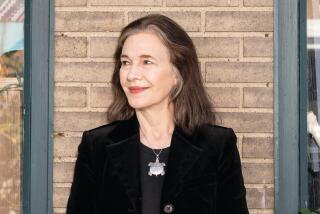Resolve and Revelation in a Harsh Landscape : THE JUMP-OFF CREEK<i> by Molly Gloss (Houghton Mifflin: $16.95; 194 pp.; 0-395-51086-4) </i>
- Share via
“The Jump-Off Creek” is the spare story of a single woman’s attempt to homestead her own place in the sparsely populated, male-dominated Oregon wilderness just before the turn of the century. In fewer than 200 pages, Molly Gloss, in her first novel, has created a classic of its kind.
It’s a case where what’s been left out contributes as much to the success of a story as much as what’s been put in. You tend to read between the lines of “The Jump-Off Creek,” and what you find in those undescribed spaces separating witheringly cruel events is enough valor to make an ordinary life seem heroic. The understatement of emotion serves to increase the reader’s appreciation of the sort of strength homesteading required, perhaps especially of women.
Lydia Sanderson, a widow, has bought a small ranch, sight unseen, on the Jump-Off Creek from a cattleman named Angell. Lost en route to her new place, wandering up and down muddied gullies in the cold rain astride her mule, she encounters a taciturn man named Whiteaker who informs her he’s to be her neighbor and then rather reluctantly sets this odd, tight-lipped and solitary woman riding off in the right direction.
She arrives at Jump-Off Creek with two mules and several goats, wearing her dead husband’s coat and gloves, possessing not much more than a few pots and some blankets. After evicting a squatter from her cabin, she surveys her domain. It’s a poor, rat-infested little place, 8-feet-by-12-feet, smelly, damp, with unchinked logs, a burnt-out stove, dirt floors, a mattress so filthy it must be tossed.
The everyday struggle of Mrs. Sanderson to survive the harsh conditions is what gives the book its heartbeat. She lives on cornmeal and goat milk, toils daylong to cut logs to make a lean-to for her precious goats, nurse a few seeds, construct a brush fence. Yet she is not given to despair or complaint, nor does the sheer weight of loneliness crush her: “I am used to being alone, in spirit if not in body, and shall not be lonely, as I never have been inclined that way,” she notes in her journal, and we believe she is capable of willing such strength.
“I had it in mind to come West and take up ranching,” she explains to Mr. Whiteaker’s partner, a half-Indian named Blue Odell. She hopes not to imply any “childishness or foolish romanticism” in the statement.
“The truth is, Mr. Odell, when my husband died I sold every last thing of his just to get the money to come West. I suppose I was seeking the boundless possibilities that are said to live on the frontier.” She utters these words while cradling the head of a dying dog that has been poisoned by wolfers.
The wolfers who squat in a neighboring cabin are a trio of raggedy men who make their living setting out strychnine-infested bait and cruel leg traps, killing wolves for their pelts and ears. They represent a sinister human element, and yet even with them we can feel sympathy for their pitifully barren lives.
Mr. Whiteaker and his partner Blue, Mrs. Sanderson and the wolfers and a friendly family named Walker--these few characters are set against a landscape so empty and harsh that they seem unspeakably marooned, separated by vast space. Yet one of the book’s great charms is how these exceptionally reserved characters begin making connections, very gradually risking the revelation of a small, personal detail, allowing themselves the pleasure of a brief, trusting encounter.
There’s plenty of action, but it’s all part of a very realistic picture that includes more mundane events, such as felling a tree, searching for a lost goat in an ice storm or the tentative, awkward initiation of a friendship.
There’s no room for pity or woefulness or any excess sentiment in this kind of story. Life was so utterly different then, the West so raw and its inhabitants grateful for the smallest material addition. It’s a reminder of how in 100 years, an amazingly short time in human history, we have so radically altered not only our landscape but ourselves.
More to Read
Sign up for our Book Club newsletter
Get the latest news, events and more from the Los Angeles Times Book Club, and help us get L.A. reading and talking.
You may occasionally receive promotional content from the Los Angeles Times.






